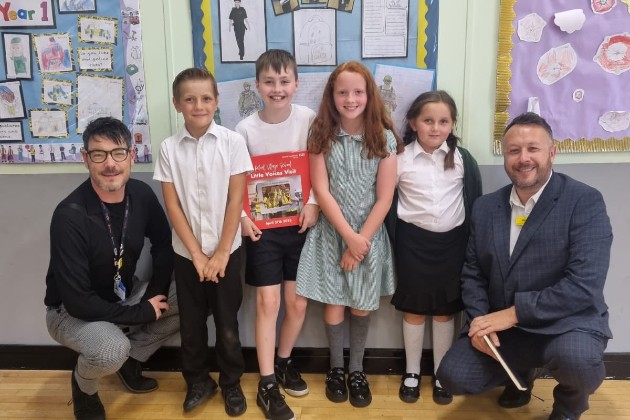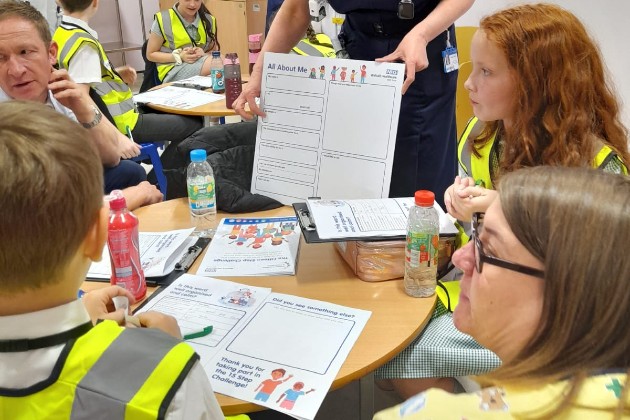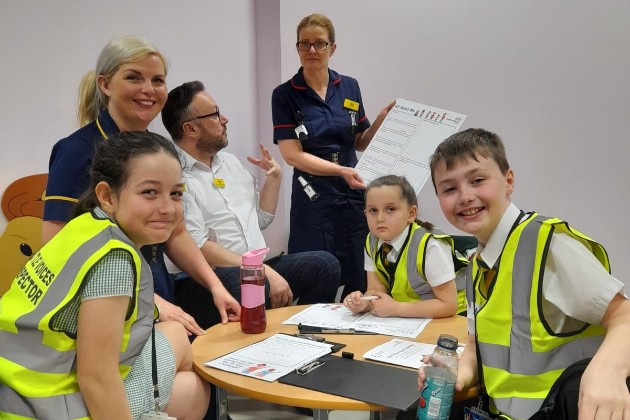The prevention of infection has always been a central component of nursing, but COVID really reminded both the workforce and public just how important it is. The aftermath of this, and realising the power of the patient experience, got Walsall Healthcare NHS Trust thinking about how to take a new approach to their infection prevention and control (IPC) improvement efforts, even with staff understandably tired post-pandemic.
As a result, their Little Voices project was born – a unique cross-department collaboration, allowing local schoolchildren from the nearby Pelsall Village School to review children and young people’s hospital services, feed back to senior leaders, influence real change and even help to recruit new nurses.

Getting off the ground
“There are of course always expectations of staff caring for patients when it comes to preventing infection, but everyone who walks into a health and care setting – big or small – has a role to play in preventing transmission,” says Amy Boden, the Trust’s Associate Director of Nursing Operations and Deputy Director of IPC.
As a first step in the Little Voices project, Amy – alongside Garry Perry from the trust’s Patient Experience team and paediatric play specialists – visited Pelsall Village School armed with emoji cushions to get the pupils onside, before teaching basic microbiology and safety procedures.

They also introduced them to the Fifteen Steps toolkit, based on the Fifteen Steps Challenge, a patient experience tool that explores health care settings through the eyes of patients and relatives. The toolkit reiterates that first impressions are sealed within the first 15 steps inside a health care setting – so what would these children’s perspectives be when they walked in?
Fresh eyes
Before long, six nine to 10-year-olds – who had either accessed the services of Walsall Healthcare NHS Trust or been close to someone who had – were on site to give their thoughts. “Anything could happen when you bring children into hospital, but they loved it,” remembers Amy.
Even if not directly about IPC, their astute observations gave a uniquely useful insight sometimes missed by the older members of the team.
For instance, the children picked up that there weren’t many toys around the PAU entrance, nor pens for the scribble wall. One boy observed needles in a trolley – useful for nurses’ access, but less so for allaying children’s anxiety. He would have been nervous if he'd seen them as a patient – so they’re now covered up.
Infection preventionists are an exhausted workforce after the pandemic, so fresh ideas have been lovely
Another pointed out that someone could have hurt themselves walking into the sensory room’s mirrors, as well as shortcomings with the accessibility of the door-handles, and freshness of the smells.
Their responses also brought about a hand-cleaning observation sheet, which children treated on the ward now complete, ticking boxes when they see staff practising good hygiene, whatever the time of day. Previously, the Trust’s IPC audits ran from 8.30am until 4.30pm, but switching to a 24-hour cycle means more accurate representation.
Why should RCN members try similar?
Amy feels the project has boosted the morale of a tired profession: “Infection preventionists are an exhausted workforce after the pandemic, so fresh ideas have been lovely” – a sentiment applicable to the whole nursing workforce.
More personally, it’s given Amy a refocus. She regularly presents to the Board, which feels more impactful after relaying the children’s feedback. In Walsall, Little Voices reflects how after initiation from the Patient Experience team, colleagues’ collaborative working has brought about something special.
But it also supports the team's relationship with and rewards their local community, with the pupils proudly showcasing their trophies, and leading assemblies about what it’s like in a hospital and IPC.
There's so much impact to a child asking if you've cleaned your hands before examining them
“It’s demystified the hospital experience,” says Amy, with the children expecting to be scared, but actually cooing over “cute babies” they spotted. They have gained insight into the variety of jobs out there – they don’t need to become nursing workers to know the role of hygiene, but would be joining a profession that would value their existing knowledge if they did.
Amy is no stranger to the pressures faced by fellow nurses – time, resources and staffing, to name a few. But following the success of the project, she wholeheartedly encourages fellow RCN members to think of similar ways they could reach out to patient populations that are perhaps still overlooked. The risk she took of integrating children into nursing efforts has certainly paid off in Walsall.
“There’s so much impact to a child asking if you’ve cleaned your hands before examining them,” says Amy. “No matter how small, everyone can make a big difference.”

Next steps
Now, the children have helped PAU’s recruitment processes, too, sitting on the interview panel for senior sisters. Candidates had to pick items to take to a desert island, to show how they interact with the young patient groups they wanted to work with. Could they creatively justify their decisions?
Initially, the matrons had reservations about including children, but the Patient Experience team persuaded them that it makes sense for them to be stakeholders in a process ultimately concerning them.
Plus, while the NHS Long Term Plan might have highlighted breaking the barriers of accessing health care, what’s more important for nursing staff is how it’s also a tangible goal on the ground.
All this has made other Trusts want to follow suit. One recently visited Walsall from all the way down South, with additional interest piqued throughout the wider IPC specialist community. The team’s recent Communicating Effectively win at the Patient Experience Network National Awards also proved “how worthwhile the project is,” according to Amy.
Walsall has another youth-focused campaign set for the year ahead – Sleep Matters, ensuring children rest properly in hospital. But with engagement expanding beyond paediatrics too, looking into incorporating more adult voices and wheelchair users’ assessments, they’re demonstrating the power of the patient far beyond the West Midlands.
Find out more
- RCN clinical professional resource Caring for Children and Young People.
- RCN guidance on the Protection of Nurses Working with Children and Young People.
- RCN clinical professional resource on Maximising Nursing Skills in Caring for Children and Young People in Emergency Care Settings.








